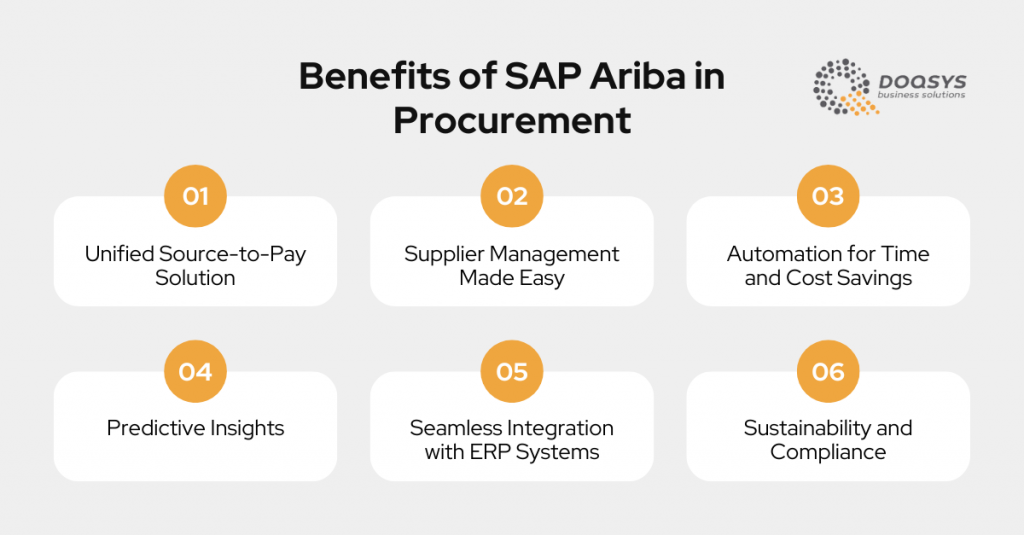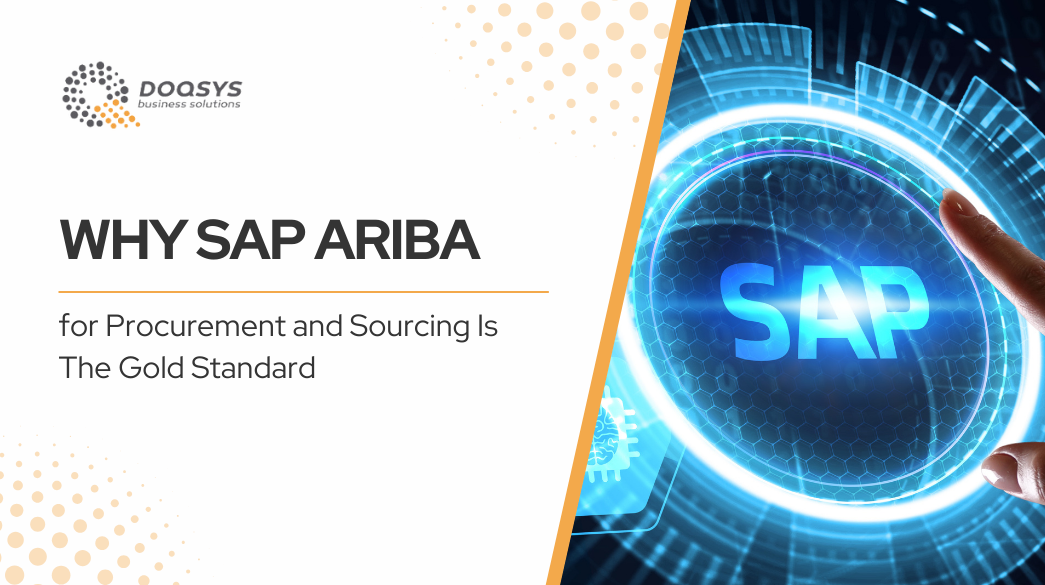The modern business world demands streamlined, efficient, and data-driven procurement processes. Enter SAP Ariba – a cloud-based platform that’s revolutionized procurement and sourcing globally. Designed to connect buyers and suppliers on a single platform, SAP Ariba offers a seamless, end-to-end solution for sourcing, purchasing, invoicing, and managing supplier relationships.
But what exactly makes SAP Ariba the leader in this space? Let’s dive in.

SAP Ariba – A Unified Source-to-Pay Solution
At its core, SAP Ariba unifies the entire procurement process into one user-friendly, cloud-based platform. Whether you’re dealing with strategic sourcing, managing supplier relationships, or automating invoice approvals, everything happens in one place. This modular design allows businesses to customize, scale, and align procurement operations to their specific needs without unnecessary complexity.
For instance, the Strategic Sourcing module simplifies supplier selection, bid management, and contract negotiations. Businesses can easily track supplier proposals, compare offerings, and secure the best terms by centralizing these processes. Meanwhile, the Buying and Invoicing module automates routine operational tasks such as purchase order generation, approval workflows, and invoice matching. It also enables seamless integrations with e-catalogs, so teams always access accurate, up-to-date product information.
The result? Reduced manual work, faster processes, and fewer discrepancies across procurement activities. By digitizing these workflows, organizations achieve not only time savings but also cost optimization – key priorities for businesses aiming to stay competitive in today’s fast-paced market.
As businesses are constantly looking for ways to optimize efficiency and reduce overhead costs, SAP Ariba delivers a clear edge by turning procurement into a streamlined, strategic operation rather than an administrative burden.
Supplier Management Made Easy
Managing suppliers effectively is one of the biggest challenges for procurement teams, particularly as supply chains grow increasingly complex and globalized. Fortunately, SAP Ariba simplifies supplier management from initial onboarding to performance evaluation and ongoing compliance monitoring.
The platform automates supplier registration, drastically reducing administrative workloads while ensuring vendors meet pre-defined qualifications. With built-in performance evaluation tools, companies can monitor key metrics like delivery timeliness, quality, and cost-effectiveness. These insights allow procurement teams to identify top-performing suppliers and address any issues proactively.
What truly sets SAP Ariba apart, however, is its global supplier network – a digital marketplace that connects over 5 million suppliers worldwide. Businesses can quickly discover, compare, and engage with new vendors based on specific criteria, such as industry certifications, pricing, or geographic location. By tapping into this vast ecosystem, companies gain better pricing transparency, supplier diversity, and risk mitigation opportunities.
The platform also enables real-time collaboration between buyers and suppliers. Teams can share updates, clarify requirements, and resolve disruptions directly on the platform, reducing delays and improving supply chain resilience. Imagine coordinating a last-minute supplier change for a critical project – all within a centralized, secure system that keeps stakeholders informed every step of the way.
Automation for Time and Cost Savings
Automation is a game changer for procurement teams, and SAP Ariba has automation baked into its DNA. From generating purchase orders to matching invoices with receipts, SAP Ariba reduces manual effort across the board. Automation not only saves time but also reduces human errors, leading to smoother processes and cost savings.
For example, invoice mismatches are a common bottleneck for businesses. SAP Ariba’s automation tools seamlessly validate invoices, ensuring that payments align with purchase orders. This prevents costly errors, improves cash flow management, and simplifies audits.
Automation also plays a key role in compliance. SAP Ariba monitors procurement processes against internal policies and sustainability goals, making it easier for businesses to enforce regulatory standards and ESG commitments.
The Power of Predictive Insights
Data is king in today’s procurement world, and SAP Ariba leverages it to provide actionable insights. Using advanced analytics, businesses can analyze spending patterns, monitor supplier performance, and identify cost-saving opportunities.
Predictive insights also extend to maintenance and risk management. By combining AI with IoT, SAP Ariba can detect inefficiencies in procurement workflows, predict equipment maintenance needs, and reduce disruptions. These data-driven insights empower businesses to make smarter decisions that align with their operational and financial goals.
In short, SAP Ariba turns data into a strategic asset, helping procurement teams stay ahead of challenges and maximize their ROI.
Seamless Integration with ERP Systems
Another major advantage of SAP Ariba is its ability to integrate seamlessly with existing ERP systems, particularly SAP S/4HANA. This integration ensures that procurement, finance, and operations teams operate with real-time visibility and shared data, eliminating silos and improving organizational efficiency.
For instance, a procurement order approved in SAP Ariba can instantly update inventory levels in SAP S/4HANA. If the inventory is low, the system can trigger automatic replenishment, ensuring smooth operations without manual intervention. This seamless data flow improves planning accuracy, reduces errors, and enables finance teams to monitor spending in real time.
SAP Ariba’s ERP integration also extends to related tools like SAP Fieldglass for external workforce management and SAP Concur for travel and expense management. By unifying these systems, businesses gain a 360-degree view of procurement-related activities, expenses, and vendor performance.
What’s more, SAP Ariba’s cloud infrastructure is built to ensure compliance with regional and global data protection standards, such as GDPR. This is particularly crucial for companies operating across multiple markets, where data security and privacy regulations can vary significantly. By leveraging SAP Ariba, businesses can confidently navigate these complexities while maintaining data integrity and accessibility from anywhere in the world.
Driving Sustainability and Compliance
Sustainability is no longer optional for businesses – it’s a necessity. SAP Ariba helps companies enforce sustainability and ESG (Environmental, Social, and Governance) goals by aligning procurement practices with ethical standards.
For example, companies can set specific vendor criteria related to environmental impact, ensuring they partner only with suppliers who meet their sustainability benchmarks. SAP Ariba’s tools also improve transparency by providing detailed reports on supplier practices and performance.
By combining compliance monitoring with supplier insights, SAP Ariba empowers businesses to achieve both profitability and social responsibility.
Why Choose DOQSYS as Your SAP Ariba Partner?
As an ADVANCED SAP Ariba partner, we at DOQSYS Business Solutions provide end-to-end support for implementing SAP Ariba solutions. From designing your ideal procurement system to ensuring seamless integration and post-go-live hypercare, our expert team is with you every step of the way.
We understand that every business is unique, which is why we tailor SAP Ariba solutions to meet your specific sourcing and procurement needs. With our proven expertise and trusted methodology, we ensure your procurement processes become more efficient, transparent, and cost-effective.
Discover the power of SAP Ariba for procurement and sourcing and take your operations to the next level. Partner with DOQSYS Business Solutions, and let’s streamline your procurement processes together.
